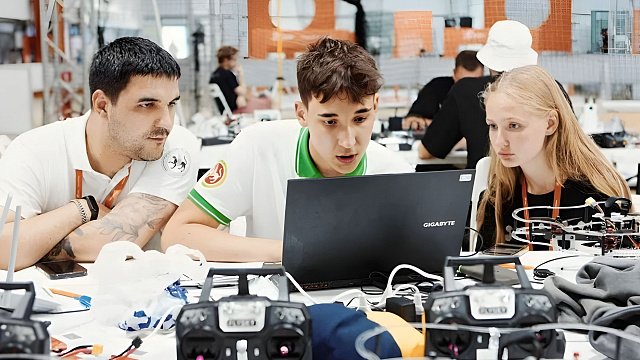23.07.24
10:30
The Archipelago 2024 project-educational intensive draws attention to unmanned technologies
Civil unmanned aviation becomes a new sector of the Russian economy
The Archipelago 2024 project-educational intensive held on Sakhalin from July 8 to 21 drew the attention of the authorities and the public to the development of unmanned technologies. The goal of the Strategy for the Development of Unmanned Aviation in Russia up to 2030 is the establishment of a new economic sector in Russia associated with the manufacture and application of civilian drones. TV BRICS is an international media partner for the event.
One of the main Russian centres supporting drone production and testing is located on Sakhalin. The scenarios of complex cadastral works, cargo delivery, and monitoring of linear and water objects were particularly popular.
One of the key activities of Archipelago 2024 was the largest drone competition in Russia. Over 600 participants from more than 60 regions of Russia competed for 10 days in designing, controlling, and developing drones. In total, more than 800 drones were used in the competition.
Robotic solutions were demonstrated in the Sea Drones tests for the following tasks: hydroacoustic detection of sunken objects, control during underwater operations, environmental situation monitoring, search and rescue, and hydrographic survey of the water area using a crewless vessel.
Maksim Evdokimov, Director of the Ecology Division of the Agency for Strategic Initiatives, told about the discussion of climate change issues at the intensiv.
“Together with experts on this platform and on other platforms, we are discussing the target model that should be created, how to establish unified registers of carbohydrate units for all BRICS countries, how to synchronise the methods of assessment of those climate projects that are being implemented, projects related to improving the efficiency of industry to reduce emissions, natural climate projects, and many others. How to carry out this synchronisation and thus ensure that investments, including in Russian projects related to ensuring climate stability and improving the environment, are very important,” he explained.
Tatyana Larionova, Chief of Staff of the RSPP Committee on Climate Policy and Carbon Regulation, pointed to the potential of the BRICS states.
“BRICS is the space where the barriers that exist in the general negotiation process can be overcome because the countries have quite similar interests. This is primarily the consumption of fossil fuels for industrial development and the preservation of natural ecosystems to achieve climate goals,” she said.
Archipelago is an annual project-educational intensive that brings together representatives of technology teams, scientific institutions, universities, businesses, and authorities. Participants among project developers get an opportunity to present their ideas, exchange experience with colleagues, and find investors and partners. In 2024, the Intensive was organised by the National Technology Initiative Platform (NTI), the Government of the Sakhalin Region, University 2035, and the NTI Project Support Fund.
Photo: NTI platform
Back

